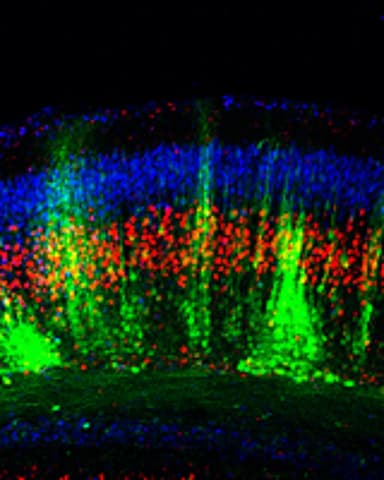Yale Team Finds Mechanism That Constructs Key Brain Structure

(Originally published by Yale University)
September 19, 2009
Yale University researchers have found a molecular mechanism that allows the proper mixing of neurons during the formation of columns essential for the operation of the cerebral cortex, they report in the Sept. 16 online issue of the journal Nature.
Scientists have known for years that information processing in the cerebral cortex depends upon groupings of neurons that assemble in the shape of vertical columns. If the number and mix of neurons in the column are wrong, severe cognitive problems can result. For instance, malformations of these columns have been implicated in some forms of autism and mental retardation. Scientists, however, have not been able to find the molecular mechanism responsible for this intermixing.

In the Nature paper, a team led by Pasko Rakic, professor and chairman of the Department of Neurobiology and head of the Kavli Institute for Neuroscience, describes one of the molecular mechanisms essential to the organizations of these key structures.
Using the most advanced molecular technology, the Yale team showed that during neuronal migration, the intermixing of neurons within column depends on the expression levels of two genes - A-type Eph receptor and ephrin-As, a ligand, or molecule that binds to the receptor. Neuronal cells failed to move laterally into proper columns in mice lacking the ligands or receptors, the team reported.
Masaaki Torii, the first author of the paper, said he was surprised to find that the tiny lateral shift of migrating neurons controlled by these molecules plays such a pivotal role in the normal cortical development.
"This so far unrecognized mechanism for lateral neuronal dispersion seems to be essential for the proper intermixing of neuronal types in the cortical columns, which, when disrupted, might contribute to neuropsychiatric disorders “ said Rakic.
Kazue Hashimoto-Torii of Yale as also an author of the paper.
The research was funded by the National Institutes of Health and the Kavli Institute for Neuroscience at Yale.